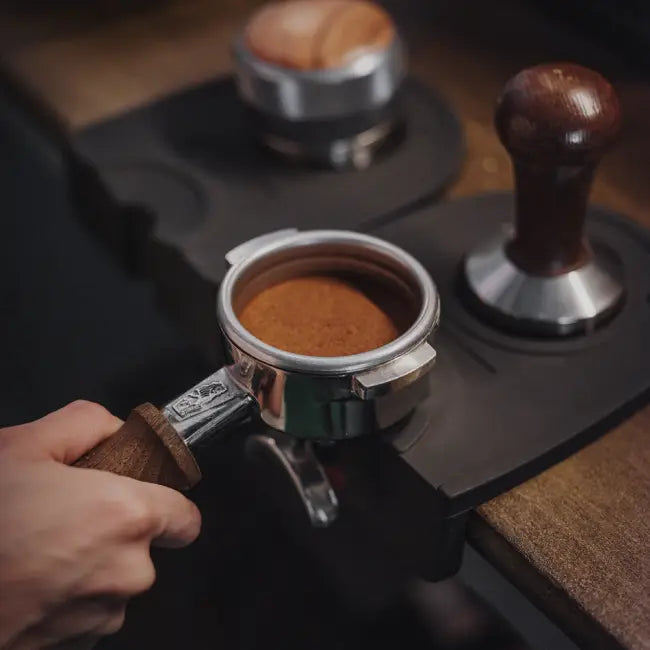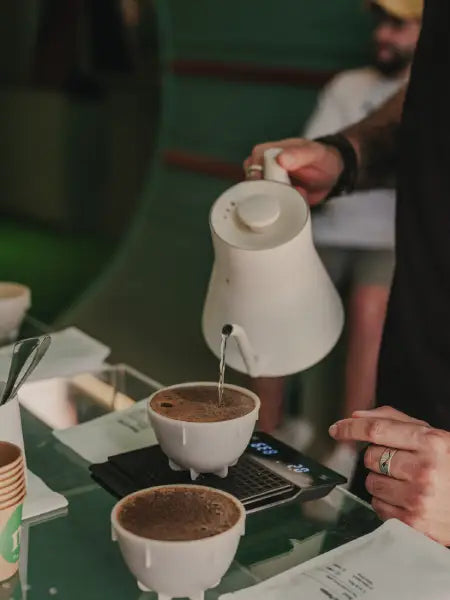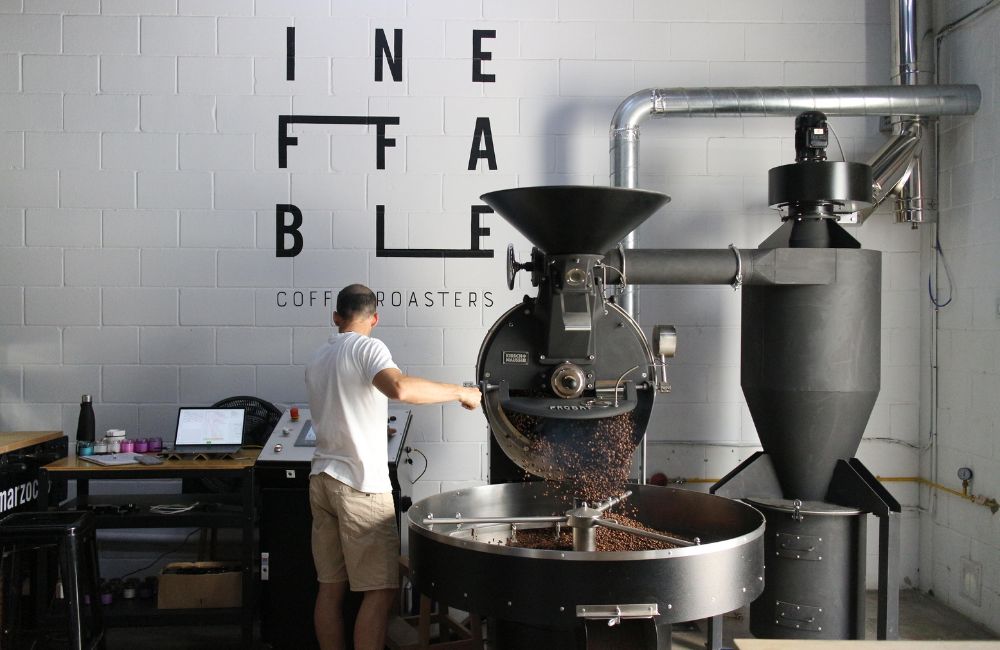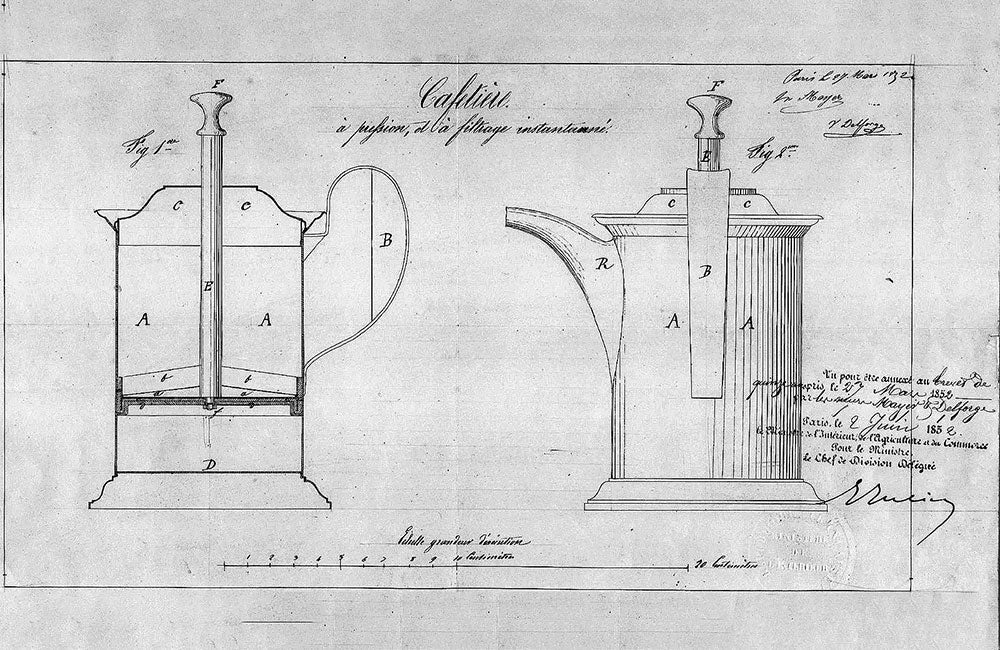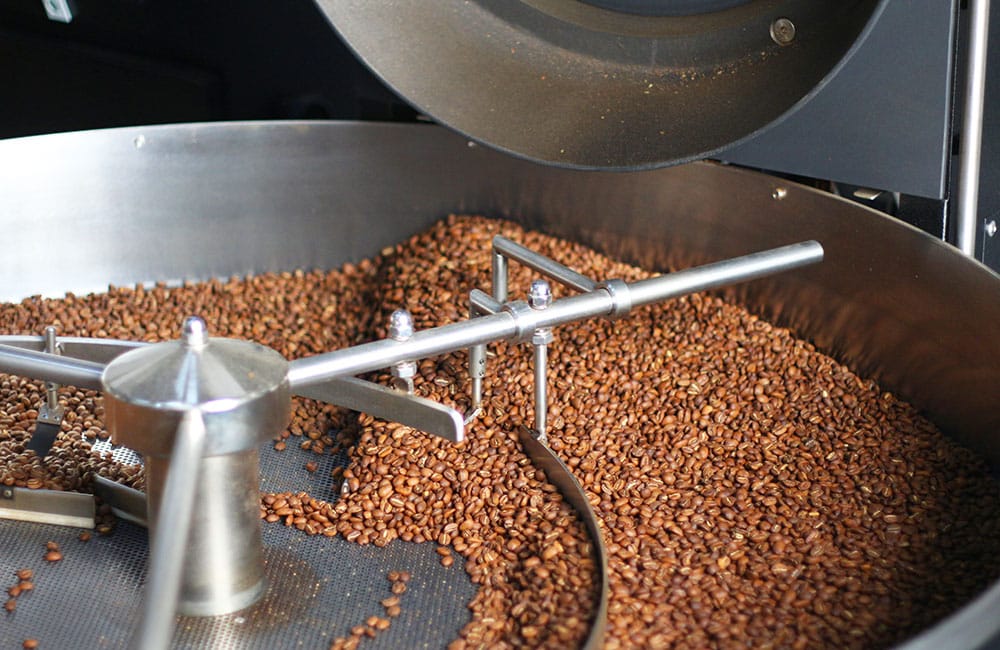Specialty coffee. Not all coffees are the same.
All coffees are equal, but some coffees are more equal than others. We wanted to start by paraphrasing George Orwell with this quote from his satirical novel "Animal Farm" because it will help us understand what specialty coffee is.
All coffees are, well, coffee. That is, coffee is the beverage obtained from the roasted seeds of coffee trees, the coffee plant.
But the coffee plant has about 120 different species, of which two are primarily used: Coffea arabica and Coffea robusta . And neither are these two identical, nor are the hundreds of varieties of each.
Factors such as climate, altitude, and terrain influence the fruit and, therefore, the seed. In addition, the harvesting, roasting, and preparation processes are also important for the final product: the cup of coffee you make or that is made for you each morning.
All coffees are coffee, but not all coffees are the same. But let's start from the beginning.
Erna Knutsen: a special woman and a special coffee
 Erna Knutsen, creator of the term "specialty coffee"
Erna Knutsen, creator of the term "specialty coffee"
Erna Knutsen was no conformist. Thanks to her love of coffee, her excellent tasting skills, and her keen eye for business, she managed to break into a world that, in the United States of the 1970s, was reserved exclusively for men.
She got her start in the coffee world working as a secretary—officially, but actually as an executive assistant—to Bert Fulmer, who owned a former coffee house.
During his time at the company, he realized that there were some coffee lots, called "broken lots," that were smaller in quantity and had special flavors that larger companies didn't want. These lots also tended to have a single origin.
Erna learned to cup—something that wasn't easy since only men could do it—and used these skills to process the "broken batches" in small roasters.
Creation of the term specialty coffee
In 1973, Fulmer appointed her vice president, and in 1974, Erna coined a term that has become a fixture of coffee lovers ever since. In an issue of the Tea & Coffee Trade Journal , Erna used the term "specialty coffee" to refer to these broken batches.
Specialty coffees, both in their cultivation, harvesting, and processing, with unique flavors and in small batches from a single origin. Furthermore, for Erna, specialty coffee wasn't just that; it involved a relationship and good treatment with the farmers and careful handling of the product all the way to its final destination: the consumer.
Since then, the term “specialty coffee” has become part of coffee culture and has come to mean a coffee whose characteristics are not only excellent, but whose maintenance is carefully considered from the producer to the cup.
The term specialty coffee has also implied, since its inception, fair treatment of coffee growers and sustainable cultivation. These are two key elements without which specialty coffee would not be sustainable over time.
Specialty coffee requires care and attention that commercial coffee doesn't. Coffee growers must receive fair compensation for their work, often through direct contact with roasters, allowing them a decent living. And, since specialty coffee cultivation depends on various environmental factors and the richness of the soil (which we'll discuss below), for it to be sustainable, it must be respectful of the natural ecosystem where it grows.
So, with all of this in mind, the question arises: what exactly does the term specialty coffee refer to?
The Specialty Coffee Association (SCA) technical definition

Specialty coffee tasting preparation at Ineffable Coffee Roasters
The Specialty Coffee Association is a non-profit, membership-based association representing thousands of coffee professionals whose mission is to foster communities around coffee and support initiatives that make coffee a more sustainable, equitable, and prosperous activity throughout the entire value chain.
This is how SCA is defined, and its work involves setting and maintaining quality standards throughout the entire production chain.
This definition also provides a very important insight into what specialty coffee is: it's not just that the coffee bean has special characteristics, but that every link in the chain—from the producer to the barista—does its part to bring out these qualities. And, what's more, everyone benefits equitably.
Currently, the SCA sets standards for green coffee, water, coffee cupping, and brewing methods. These standards are quantifiable and qualifiable recommendations based on scientific evidence.
The SCA defines specialty coffee in its green stage as a coffee that has no primary defects, no quakers, is of adequate size, has been properly dried, is presented in the cup free of defects, and has particular organoleptic qualities.
Essentially, what this means is that the SCA has conducted experimentation supported by the scientific method and, based on this, has set standards to deduce the qualities and elements that make a coffee considered specialty.
Based on these standards, different methods have been developed to quantify them. These range from the score a green coffee can receive to the possible notes we can perceive during tasting.
Specialty Coffee Rating
One of these standards, which reflects the cultivation process, is the score a green coffee receives. This score indicates that the variety, terrain, altitude, and other factors affecting the coffee have specific characteristics.
And it's perhaps one of the most representative scores of specialty coffee. Although we mustn't forget that specialty coffee isn't just about this score. It's also, and beyond the score, about good practices throughout the entire production chain, from the coffee farmer to the cup, and a decent wage.
Green coffee scoring is based on visual inspection of the beans—once harvested and processed—to determine the percentage of defective beans, and on tasting the beans once roasted.
Based on this, the tasters, who have received thorough prior training, score the coffee.
- Less than 80 points: no alcohol. Not considered specialty coffee.
- Between 80 and 84.99: very good
- Between 85 and 89.99: excellent
- Between 90 and 100: exceptional
So we see that, while it would be easy to define a specialty coffee as one that obtains a score greater than 80 in the cupping, this is only one of the factors—important, yes, but only one—that influence what a specialty coffee means.
What do we understand as specialty coffee today?
 Freshly picked specialty coffee cherries
Freshly picked specialty coffee cherries
Since Erna Knutsen first coined the term, it has evolved to mean a measurable and quantifiable quality standard at all stages of the coffee production chain and fair treatment for all involved.
In an article by Ric Rhinehart for the Specialty Coffee Association of America (SCAA) in June 2009, updated and republished on the SCA website in March 2017, he proposes two terms that help us understand the role played by everyone involved in the coffee production and processing chain: potential and conservation.
Potential is what each coffee bean hides as a promise of a delicious taste experience.
For this to be possible, all those involved in the processes that can alter the qualities of coffee must work hard to improve it, not worsen it. Or, at least, to maintain its quality.
The coffee farmer begins by choosing the land to plant, with suitable altitude and climatic conditions. He or she selects the variety to grow and provides it with the necessary care, without the use of chemicals or pesticides. The coffee is then harvested only when it is ripe.
From fermentation and drying to roasting and brewing, each of these steps must be carried out carefully to extract the full potential of the coffee bean.
The second term, conservation, refers to the actors not directly involved in coffee handling—although they are often the same—and involves everything from harvesting it at the right time, storing it and transporting it with care to ensure it doesn't damage the coffee, to packaging and grinding.
Importance of the value chain
As we can see, for a coffee's potential and preservation to be optimal, everyone involved must do their part with attention and care.
If one element fails, the entire chain collapses. It's of little use for coffee grown in excellent soil and at the right altitude if it's then fermented and dried poorly, transported improperly, roasted incorrectly, or prepared carelessly.
For this reason, for Erna Kuntsen, specialty coffee was not just a term to define a type of coffee, but an entire value chain from coffee grower to consumer.
And maintaining a chain means that its members help and support each other through fair and equitable treatment for all.
To understand how the entire process affects coffee, we must briefly consider the factors that make a coffee truly special.
Factors at origin that determine a specialty coffee
 Raised beds for drying specialty coffee in Matyazo, Rwanda
Raised beds for drying specialty coffee in Matyazo, Rwanda
There are many factors coffee growers must consider to achieve specialty coffee, from the variety of the plant and the type of soil to the climate and altitude.
And all of these affect the final flavor of the coffee.
As for the variety of the plant, coffee trees or coffee plants belong to the Rubiaceae family.
Of this large family, some are the privileged ones: the genus Coffea , which has more than one hundred species, but of which we are really interested in two: Coffea arabica and Coffea canephora (or robusta).
Of these two, specialty coffee comes almost exclusively from Coffea arabica , with a few exceptions of high-quality robusta.
This is because the Coffea arabica variety is more aromatic and delicate than the robusta variety and offers a more sophisticated experience on the palate.
It's important to mention that the Coffea arabica variety has hundreds of different sub-varieties, each with specific organoleptic characteristics. This means that tasting profiles can vary greatly, even when the coffee beans come from the same species.
Among the many well-known ones we find: Caturra, Típica, Bourbon, Geisha, Pacarama, SL28, SL34 or Mundo Novo.
Other important factors
Other important factors include the soil and altitude at which the crop is grown, the area's climate, the soil's microbiology, and the topography. These factors aren't mere oddities; they have an impact on the final product.
For example, we all know that a coffee from Brazil doesn't have the same notes on the palate as a coffee from Kenya. This is due both to the variety of the plant grown and to all the conditions we've mentioned.
Generally speaking, a Coffea arabica plant grows at high altitudes—between 600 and 2,000 meters—with a cool climate—between 15 and 24 degrees Celsius—and an average annual rainfall of 1,500–2,000 mm. The differences between these conditions and how different varieties react to them are what give us the great and rich diversity of coffees.
In addition to these general conditions, there are many other regional-specific factors that also influence the quality of the soil where the crop is grown, which will be reflected in the fruit.
Another factor may be the method used to plant the coffee trees, whether it's a single plantation or planted among other plantations and vegetation. The latter can be an important factor, since shaded coffee trees will ripen more slowly and have a higher sugar concentration. Often, the type of plantation will depend on the region where the tree is grown.
Of course, no chemicals or pesticides that could harm the coffee cherries should be used during cultivation.
Having briefly explained how both topographical and climatic conditions affect coffee, we can understand that coffee is a seasonal product. In most coffee-growing countries, the crop is harvested once a year (with the exception of some countries where conditions allow for more than one harvest), and the quality of the harvest depends on factors such as climate, rainfall, and, above all, the expert work of the harvesters and their subsequent proper processing.
Coffee processing and other factors
 Specialty coffee drying beds in Sao Silvestre, Brazil
Specialty coffee drying beds in Sao Silvestre, Brazil
Aside from the factors we've described, over which coffee growers don't have much direct control, there are others over which they do have effective control. These include care, harvesting, sorting, processing, storage, and transportation.
When it comes to cultivation practices, everything a coffee grower does—from fertilizer use and shade management to planting patterns and pruning regimens—will affect the outcome of the crop.
A particularly important practice for coffee quality is harvesting. As with other crops, coffee is best when harvested at optimal ripeness, but, of course, coffee cherries do not ripen at a uniform rate.
This means that, to achieve the best results, they must be hand-picked by trained workers. This requires greater dedication and workload, which increases the quality and, consequently, the price.
Commercial coffee, by contrast, is generally harvested by machine, with the consequent loss of quality.
Types of processing
Once the coffee cherries have been picked, ideally at their peak ripeness, processing begins.
Generally, after harvesting, an inspection is carried out to ensure that all coffee cherries are at their peak and free of defects. Cherries that do not make the cut for specialty coffee—or for a specific profile—are used to make other batches of lower quality. Once this selection is complete—and is repeated during drying—the cherries are processed.
As for coffee processing, we find three main forms: natural, washed and “ honey ”.
- Natural process : This involves letting the cherry dry with the grain. It requires little machinery and water, but a lot of work and knowledge to obtain a good result. Once dry, it is threshed to separate the grains from the husk.
- Washing process: The cherries are pulped mechanically, separating the cherries from the beans. During this process, the mucilage is completely removed in the fermentation and washing tanks. The cherries are then left to dry until the desired moisture content is reached.
- “ Honey ” process : after pulping the cherry, the berries are left to dry with the mucilage, which gives the final product different characteristics from the washed and natural ones.
The way a coffee is processed will affect its final flavor. For example, washed coffees tend to have higher acidity, with clean, fruity notes, than natural coffees.
Finally, both the way in which coffee beans are selected once they have been dried to discard those with defects, and the method and temperature of storage and transportation, are factors that can slightly alter the chemical composition of the bean and, therefore, its flavor.
For example, specialty coffee beans must be dried uniformly, and this requires constant supervision. Once dry, they must be stored in bags that protect them from direct light and extreme temperatures.
As we've seen so far, quality coffee requires special conditions and treatment. For coffee growers to be able to dedicate themselves to this, they must be taken into account throughout the entire production and sales chain and receive fair compensation for their work.
The impact of specialty coffee on countries of origin
 Coffee grower from the Sao Silvestre farm, Brazil
Coffee grower from the Sao Silvestre farm, Brazil
Coffee is a commodity sold on futures markets and the total industry value, according to the OEC , was thirty billion dollars in 2018.
It is not the second best-selling commodity (as is sometimes claimed), nor even the first best-selling agricultural product, which would be oats, but it is on the list of best-selling commodities with an economic impact that in some countries reaches 7% of GDP.
The fact that coffee is sold on futures markets opens the door to all kinds of speculation and the resulting harm to coffee growers. For this reason, specialty coffee is based on direct trading.
Specialty green coffee importers deal directly with coffee farms or cooperatives to purchase their production directly.
Today's ease of communication and transportation has also made it possible for many roasters to purchase directly from coffee farmers. At Ineffable Coffee, we have lots we've acquired this way.
This ensures that coffee growers receive a fair price, since the number of intermediaries is reduced.
Furthermore, those who buy coffee appreciate it and understand that quality coffee requires special attention and care, and this is only possible when a price is paid that allows those who grow it to live decently.
Impact of specialty coffee versus commercial coffee
To understand the difference between the impact of specialty coffee on producing countries and coffee growers versus commercial coffee, we can compare it to buying vegetables at a supermarket or a farmers' cooperative.
In the first, large retailers hold the monopoly and set prices, often with a large number of intermediaries, meaning farmers receive little or no fair reward for their work.
Whereas, if we buy from a cooperative, we are paying almost the full price to the farmer, which will allow them to live a more dignified life and do their work better.
For this reason, promoting specialty coffee is not just a matter of taste, but also has an ethical rationale.
The fact that the number of intermediaries is reduced means that each of them—those that are necessary—plays a very important role.
The specialty coffee production chain, in a simplified form, is as follows: coffee grower – cooperative/importer – roaster – cafeteria – consumer.
In this chain, the roaster plays a very important role as a link between the origin - the coffee grower - and the final recipient - the consumer.
The impact of specialty coffee on the ecosystem
Specialty coffee, as we've been outlining, is not just delicious coffee, but also ethical coffee. Everyone involved in the production chain is taken into account, ensuring they receive fair compensation that allows them to live a decent life.
In addition, specialty coffee is—and should be—sustainable and environmentally friendly.
It must be so, because if it weren't, the delicate ecosystem needed for its cultivation would disappear. And it is because all farming practices—which aren't monocultures, which utilize local natural resources, and which don't use chemicals, among others—favor this.
Specialty coffee farmers often have small farms that are perfectly integrated into their surrounding ecosystems. They work to ensure that their farming practices respect and support the ecosystem, since they, too, need it.
That's why we say that specialty coffee is delicious coffee, but also ethical and sustainable.
The work of a specialty coffee roaster

Coffee roasting at Ineffable Coffee Roasters
The specialty coffee roaster plays a very important role in the coffee production chain. They are the liaison between importers or cooperatives who handle the product at source and the coffee shops that deal with the final recipient.
Their main task is to select coffees from among the varieties offered by importers/cooperatives and roast each one precisely to extract the best from each coffee.
As we said before, the roaster's job is to enhance the raw material that reaches them through roasting.
Different coffees, different roasts
Roasts vary depending on the characteristics of the coffee, such as altitude or variety, and the processing process. Factors such as roasting time and temperature will affect the final product.
For example, a lightly roasted coffee will have more acidity and fruitier notes than a medium-roasted one. However, the type of coffee, density, humidity, etc., and each roaster will determine the roasting process for a coffee.
More and more roasters are launching into the direct sale of specialty coffee online —and this can be an advantage for consumers—but it doesn't mean that specialty coffee shops are no longer important.
Drinking coffee has been, and will continue to be, a social activity for centuries, and specialty coffee shops play an essential role in this chain. They are also places where the end customer is shown the value of the entire production chain.
The specialty coffee shop and the barista
 Specialty coffee shops are a very important part of the process
Specialty coffee shops are a very important part of the process
If we had to define the three roles that most directly impact coffee quality, the first would be the coffee farmer, the second the roaster, and the third the specialty coffee shop and barista.
We've already briefly explained the roles of the coffee farmer and roaster. We still need to explain the roles of the specialty coffee shop and the barista.
Specialty coffee shops are where the coffee bean's journey ends and the coffee experience culminates. To fully reflect the above value chain, it is essential that the barista—the person in charge of preparing the coffee—has extensive knowledge of coffee and preparation methods and keeps them constantly up-to-date.
Equip yourself with our accessories, visit our store
Knowledge that the barista must have
Each coffee grower will work to get the most out of their plants and obtain quality coffee.
The roaster will roast this coffee, striving to respect the tasting profile. Each coffee has a roasting point where it truly reaches its best; that point where the farmer's hard work, the unique qualities of the soil, and the conditions in which it grows are highlighted.
The barista , in turn, will have to know both the coffee variety and the roast to create a recipe that extracts the coffee's maximum potential.
For this, it is important that you know all the preparation methods: the espresso machine, the filter methods, infusion, etc. In addition, you should know how the different parameters, such as the grind size, the water temperature, the water/coffee ratio, etc. affect the final product (you can consult our coffee preparation guides ).
And finally, you must know how to convey all of this to the customer in a way that they can appreciate it as much as you do and be aware of the effort and work that everyone involved has put in so that they can enjoy that cup of coffee.
The social role of coffee and specialty coffee shops
 Rebel Café specialty coffee shop in Madrid
Rebel Café specialty coffee shop in Madrid
Traditionally, in countries like Kenya and Mexico, coffee has always been a social ritual intended to strengthen human relationships. In today's globalized and urbanized society, coffee shops can fulfill this role.
A pleasant environment, with good service and great coffee can be the perfect ingredients to transform customers from seeing a coffee shop as a place where they simply go to get their caffeine fix to a place where they feel comfortable and inspired.
The specialty coffee community in Spain is growing steadily. Every day, more roasters, cafes, and individuals want to enjoy the exquisite taste and social experience that specialty coffee offers. They also understand that our consumption habits have a significant impact on our planet and the people who live on it, and they try to support projects that take this into account.
We, as specialty coffee roasters in Seville , are, and want to continue being, part of this beautiful community built around coffee.
And you, are you in?

